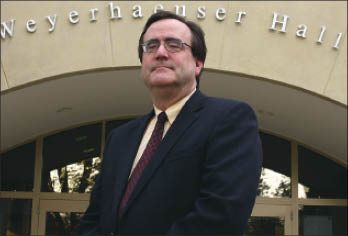
Home » Business-school dean wants everyone in on the secret
Business-school dean wants everyone in on the secret
Whitworth's Beatty hopes to boost school's visibility, connect with private sector

February 10, 2011
The way Bob Beatty sees it, Whitworth University's School of Global Commerce and Management is known, but not well known, in the Spokane-area business community.
Because of that, his vision is for greater visibility and more interaction between the private sector and the private Christian school's business students.
"We're a best-kept secret," says Beatty, who is in the middle of his first academic year as dean of the School of Global Commerce and Management. "We need to see how we can help businesses. We have connections, but we want stronger connections."
On campus, the business school already has a strong presence. Just over 15 percent of the 2009-2010 graduating class majored in business, the largest percentage of students in any one undergraduate major. During the current school year, 411 undergraduate students, accounting for 15 percent of all Whitworth undergraduates, are majoring in business, again the largest percentage of students for any undergraduate major.
Off campus, Beatty wants the business school to build stronger ties with businesses here. He would like, however, to let a strategic-planning process determine how those relationships develop.
The university has started a strategic-planning process to map out its goals for the next three to five years. Beatty says the business school will develop a plan of its own that dovetails with that of the university as a whole by asking all of those involved—students, teachers, alumni, and business leaders—how they think the business school should evolve between now and the 2015-2016 school year.
Beatty hopes to have the business school's strategic plan in place by the end of this year. Such a plan could include new degrees or new degree areas—Whitworth business students currently select one of five areas in which to focus: accounting, marketing, economics, international business, or business management. The plan also could include new graduate-level offerings that would be offered in conjunction with the university's current master of business administration and master of international management programs.
While Beatty wants to let the process play out, he has seen some programs at other schools that could work well at Whitworth. For example, the business school at Northern Illinois University, where Beatty worked as an associate professor prior to taking the Whitworth post, operates what's called an experiential learning center, in which students take on projects for businesses. Such projects might include researching ways a restaurant can use technology to improve customers' experiences or creating an instruction manual and video for an insurance company. Beatty says the learning center had about 10 projects a semester on which students work with businesses.
Also, Beatty has a strong information-systems background, an area in which the business school doesn't focus presently. While Beatty says he'd welcome the opportunity to create more of an information-systems presence at Whitworth, he won't actively lobby for it.
"If at the end, if that's what everybody wants, great," he says. "But that's not my goal walking in the door."
Going into the strategic-planning process, Beatty says there are some attributes of the business school that won't change. He says he likes that business students come to the school with a broad liberal-arts training and an emphasis on an international education. Also, he says, the school's professors have extensive real-world experience, something he says is essential when teaching business.
"One of the things to look at is, we've all done it before," Beatty says, speaking of himself and the business professors. "If you're going to help people fulfill their dreams, you have to have fulfilled your dreams."
Beatty spent a lot of time attaining his goals before moving into academia.
A native of Cedar Rapids, Iowa, Beatty attended Texas Christian University, in Fort Worth, Texas. He says he chose TCU for many of the same reasons students select Whitworth: It was a relatively small school with small classes that incorporated faith into the curriculum. He graduated with a bachelor's degree in computer science.
Upon graduation, Beatty entered the U.S. Air Force and worked as a nuclear planning analyst. He remains involved in the military as a lieutenant colonel for the U.S. Air Force Reserves, overseeing a squadron based at Travis Air Force Base, in California. As part of his reserve duty, he spent a year in Afghanistan in the mid-2000s.
After leaving active duty in the late 1980s, Beatty became involved in information systems, working first for Amerada Hess Corp., in Tulsa, Okla. There, he oversaw a multimillion-dollar natural gas volume control and marketing system. Kellogg Co., the Battle Creek, Mich.-based cereal maker, hired him away from the Tulsa oil company and had him head up the company's international technology systems.
Beatty says the job required extensive travel. On one business trip, when Beatty was in his third country in seven days, he learned that his daughter had started walking while he was away from home.
He decided at that point to do something else, something that wouldn't take him so far from home so frequently.
Beatty earned a master of business administration and two years later, a doctorate in business administration from Mississippi State University.
He taught at a couple of different schools before returning to TCU to help it start an e-commerce program. That program is billed as the first-ever accredited e-commerce offering. He would later leave TCU to return to a school closer to his hometown: Northern Illinois University.
At each juncture of Beatty's career, the attraction to change was similar: He was given an opportunity to be involved in taking something small and making it bigger or better.
"I'm a builder," Beatty says. "I love the challenge of building new things and bringing them to success."
Latest News
Related Articles





_web.jpg?1729753270)